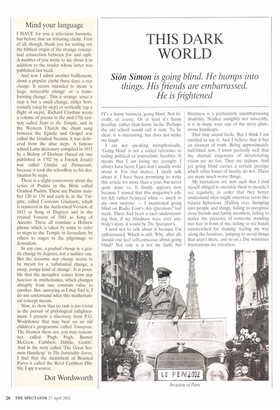Mind your language
I HAVE for you a television footnote, but before that an irritating cliche. First of all, though, thank you for sorting out the biblical origin of the strange conceptual connection between few and eight. A number of you wrote to me about it in addition to the reader whose letter was published last week.
And now I admit another bafflement, about a popular cliché these days: a step change. It seems intended to mean 'a large, noticeable change' or 'a transforming change-. This is strange, since a step is but a small change, either horizontally (step by step) or vertically (up a flight of steps). Richard Crashaw wrote a volume of poems in the mid-17th century called Steps to the Temple, and in the Western Church the chant sung between the Epistle and Gospel was called the Gradual because it was delivered from the altar steps. A famous school Latin dictionary compiled in 1815 by a Bishop of Durham (based on one published in 1702 by a French Jesuit) was called Gradus ad Pamassum, because it took the schoolboy to his destination by steps.
There is a slight controversy about the series of Psalms in the Bible called Gradual Psalms. These are Psalms number 120 to 134 and each is, in the Vulgate, called Canticum Graduum, which is rendered in the Authorised Version of 1611 as Song of Degrees and in the revised Version of 1881 as Song of Ascents. These all translate a Hebrew phrase which is taken by some to refer to steps to the Temple in Jerusalem, by others to stages in the pilgrimage to Jerusalem.
In any case, a gradual change is a gentle change by degrees, not a sudden one. But the tiresome step change seems to be meant for a 'substantial change, a steep, jumpy kind of change'. It is possible that the metaphor comes from step function in mathematics, which changes abruptly from one constant value to another. But, annoying as I may find it, I do not understand what this mathematical concept means.
Now, to show that no task is too trivial in the pursuit of philological enlightenment, I present a discovery from P.G. Wodehouse that may bear on an old children's programme called Trumpton. The firemen there are, you may remember, called 'Pugh, Pugh, Barney McGrew, Cuthbert, Dibble, Grubb'. And in the story called 'The Great Sermon Handicap' in The Inimitable heves, I find that the incumbent of Bousted Parva is called the Revd Cuthbert Dibble. I spy a source.
Dot Wordsworth


































































 Previous page
Previous page